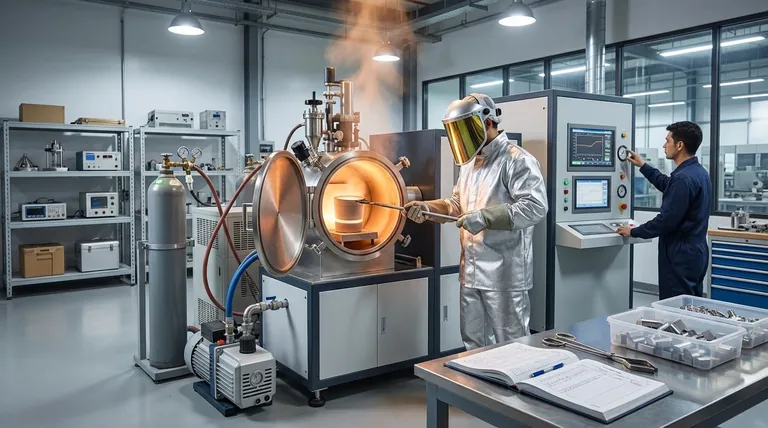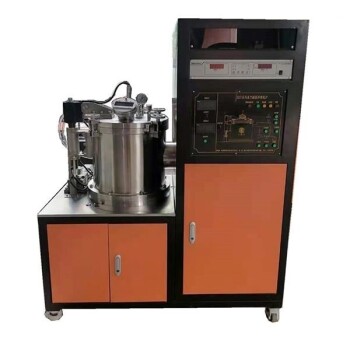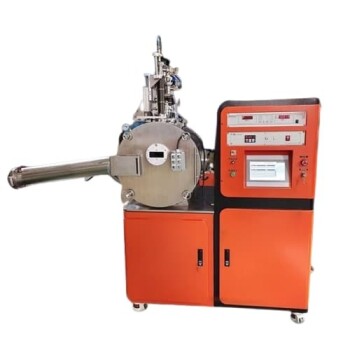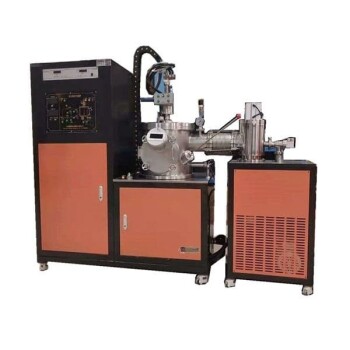While induction melting is prized for its speed and efficiency, its primary disadvantages lie in its limited refining capabilities, sensitivity to charge material quality, and stringent operational safety requirements. The technology excels at melting clean metals but is less effective at handling contaminated scrap or removing impurities like sulfur and phosphorus, which requires different furnace conditions.
The core trade-off of induction melting is accepting operational complexity and metallurgical limitations in exchange for exceptional speed, energy efficiency, and precise temperature control. It is a remelting tool, not a primary refining process.

Operational Complexity and Safety Demands
Induction melting is not a simple "set it and forget it" process. It demands a controlled environment and highly skilled personnel to operate safely and effectively.
The Need for Skilled Operators
The system requires constant monitoring. As noted in safety protocols, operators must watch air pressure gauges during heating to prevent catastrophic failures like a quartz tube cracking, which could lead to equipment damage and serious personal injury.
Strict Atmospheric and Safety Protocols
Certain processes require melting under a controlled, inert atmosphere, such as flowing argon. This adds complexity and cost to the operation and is essential for preventing oxidation of reactive metals. Operators must also wear specific protective gear to shield them from the intense electromagnetic fields and potential metal splash.
High-Voltage Electrical Hazards
The fundamental principle of induction melting relies on a high-voltage primary coil. This introduces significant electrical hazards, requiring robust safety interlocks, proper grounding, and well-trained technicians for maintenance and operation.
Understanding the Metallurgical Limitations
The very physics that makes induction melting efficient also imposes certain limitations on the types of materials it can process and the metallurgical work it can perform.
Ineffective Slag Removal and Refining
The inductive stirring that creates a homogeneous molten bath is a disadvantage for refining. It prevents the slag—a layer of impurities that floats on top—from separating cleanly. Furthermore, the slag layer remains much cooler than the metal because the electromagnetic field primarily heats the conductive metal bath.
Difficulty with Low-Quality or Contaminated Scrap
Because of its poor refining capability, induction melting is not well-suited for processing dirty, oily, or heavily oxidized scrap. These contaminants can introduce unwanted elements into the melt, increase slag volume, and potentially damage the furnace's refractory lining.
Limited Temperature Control for Slag
Crucial refining processes, such as removing phosphorus and sulfur, require a hot, fluid, and chemically active slag. Since induction heating keeps the slag relatively cool, these vital refining reactions are inefficient or impossible to carry out, making the technology unsuitable for primary steelmaking from raw materials.
Financial and Infrastructure Trade-offs
While operationally efficient, the initial setup and ongoing maintenance for an induction furnace represent significant considerations.
High Capital Investment
The initial purchase price of an induction furnace system, particularly its sophisticated high-frequency power supply and control units, constitutes a major capital expenditure compared to some simpler furnace types.
Refractory Lining Maintenance
The refractory lining that contains the molten metal is a critical consumable component. It is subject to wear from thermal cycling, chemical attack from the melt, and physical erosion. This requires a rigorous schedule of inspection, patching, and eventual costly replacement, which involves significant downtime.
Dependence on a Stable Power Grid
The advanced power electronics used in induction furnaces are sensitive to fluctuations, surges, and harmonics in the electrical supply. A stable and "clean" power source is non-negotiable for reliable performance and to prevent damage to the equipment.
Making the Right Choice for Your Goal
Selecting the correct melting technology depends entirely on your raw materials and desired final product.
- If your primary focus is melting clean, pre-alloyed metals with high precision: Induction melting is an excellent choice due to its speed, control, and efficiency.
- If your primary focus is processing large volumes of raw ore or contaminated scrap: An Electric Arc Furnace (EAF) is far better suited due to its ability to handle impurities and perform robust refining.
- If your primary focus is small-scale casting with a low initial investment: A traditional fuel-fired crucible furnace may be more appropriate, despite its lower thermal efficiency.
Ultimately, understanding these disadvantages allows you to leverage induction melting for what it does best: clean, fast, and controlled remelting.
Summary Table:
| Disadvantage Category | Key Limitations |
|---|---|
| Operational & Safety | Requires skilled operators, strict safety protocols, and controlled atmospheres. High electrical hazards. |
| Metallurgical | Ineffective slag removal and refining. Unsuitable for contaminated scrap or primary steelmaking. |
| Financial & Infrastructure | High capital cost, frequent refractory lining maintenance, and dependence on a stable power grid. |
Need a melting solution tailored to your specific materials and goals?
While induction melting has limitations, KINTEK specializes in providing the right lab equipment for your unique needs. Whether you require precise temperature control for clean alloys or robust systems for handling contaminated scrap, our experts can help you select the ideal furnace technology.
Contact us today to discuss how KINTEK's solutions can optimize your laboratory's melting processes and improve efficiency.
Visual Guide

Related Products
- Lab-Scale Vacuum Induction Melting Furnace
- Vacuum Heat Treat Furnace and Levitation Induction Melting Furnace
- 600T Vacuum Induction Hot Press Furnace for Heat Treat and Sintering
- Vacuum Induction Melting Spinning System Arc Melting Furnace
- Vacuum Arc Induction Melting Furnace
People Also Ask
- Can an induction furnace melt titanium? Mastering the Challenge of Melting Reactive Metals
- How is conventional heating different from induction heating? Direct vs. Indirect Heat Explained
- What can you do with an induction heater? Achieve Rapid, Flameless Metal Heating
- Why is a vacuum induction melting furnace required for Pt/Pd alloy catalysts? Ensure Purity and Precision
- How does a melting furnace work? A Deep Dive into Induction and Arc Furnace Technology
- What is the power consumption for melting light aluminum scrap? Optimize Your Energy Efficiency and Costs
- How efficient is inductive heating? Achieve 90% Energy Efficiency with Direct Heating
- Why is induction heating used? Unlock Rapid, Precise, and Clean Heat for Your Process



















